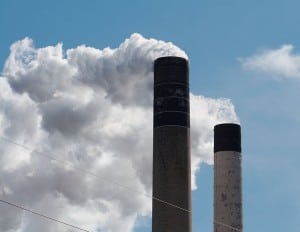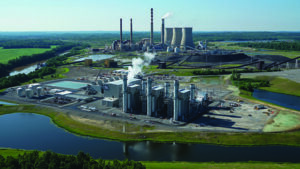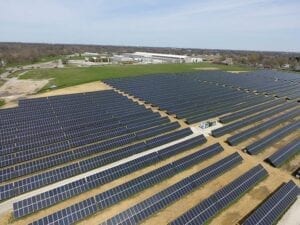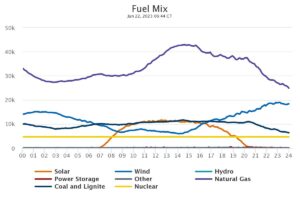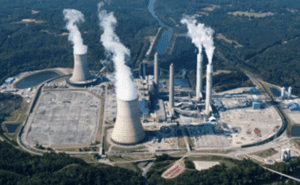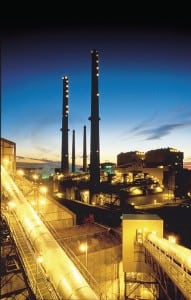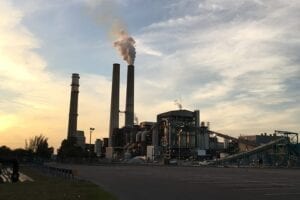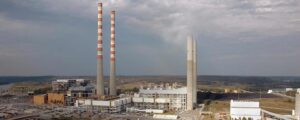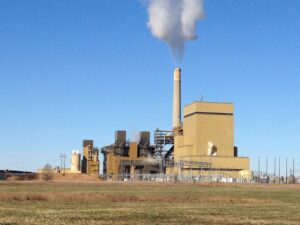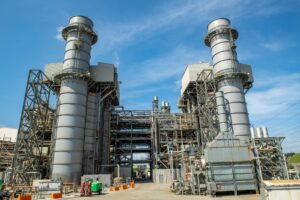EPA
-
Legal & Regulatory
EPA Unleashes Four-Pronged Assault on Fossil Fuel Power Pollution
In an unprecedented move, the U.S. Environmental Protection Agency (EPA) on April 25 simultaneously finalized four major environmental rules covering greenhouse gases (GHG), air toxics, wastewater discharges, and coal combustion residuals from fossil fuel-fired power plants. Among the rules is the EPA’s final Carbon Pollution Standards, which marks the agency’s third attempt to broadly curb […]
-
Legal & Regulatory
Federal U.S. Power Sector Initiatives Went Full Throttle in April: Here’s the List
The Biden administration has unveiled several sweeping actions over the past month aimed at boosting clean energy deployment, enhancing manufacturing jobs, and reducing pollutant emissions across the power sector. The measures—many announced as part of a comprehensive Earth Week agenda on April 25—are notable for their strategic push in an election year, highlighting the administration’s […]
-
Legal & Regulatory
EPA Denies Industry Petition to Delist Stationary Combustion Turbines as Hazardous Pollutants
The U.S. Environmental Protection Agency (EPA) has denied an industry petition seeking to delist stationary combustion turbines from the agency’s list of hazardous air pollutants (HAP) major source categories regulated under section 112 of the Clean Air Act (CAA). The agency’s final action on April 11 responds to an August 2019 petition filed by several […]
-
Legal & Regulatory
EPA Drops Existing Gas-Fired Plants from Contentious Power Plant GHG Rule
(Updated March 7 with responses from EPA): The U.S. Environmental Protection Agency (EPA) will drop requirements covering existing natural gas-fired power plants in its final Section 111 rule regulating power sector greenhouse gas (GHG) emissions, which is expected in April. EPA Administrator Michael Regan on Feb. 29 said in a written statement the agency’s rule—which the […]
-
Legal & Regulatory
EPA Rolls Out Final, More Stringent PM2.5 Standard
The U.S. Environmental Protection Agency (EPA) in February issued a final rule imposing tighter restrictions on fine particulate matter (PM2.5) or soot. The final rule, issued on Feb. 7, strengthens the nation’s National Ambient Air Quality Standards (NAAQS) by lowering the level of the primary (health-based) annual PM2.5 standard from 12.0 micrograms per cubic meter […]
-
Coal
PJM Urges Delayed Retirement of 840-MW Fossil Fuel Power Plant, Citing Reliability Impacts
PJM has urged Talen Energy to delay its deactivation of two of four units at the 840-MW coal, oil, and gas–fired Herbert A. Wagner Generating Station in Maryland until transmission upgrades are put into service around 2028. The nation’s largest regional transmission organization (RTO) on Jan. 10 said it informed Talen that the deactivation of […]
-
Legal & Regulatory
A Review of Air Quality Rules and a Look at 2024
Federal regulators in 2023 proposed a variety of new air quality rules, and 2024 is likely to see these proposals become final and enforceable. Here’s a look at the past year, and a look ahead at the major
-
Hydrogen
Pioneering Hydrogen-Powered Gas Peaking: Inside Duke Energy’s DeBary Project
In late 2024, a first-of-a-kind, fully functional project spearheaded by Duke Energy, GE Vernova, and Sargent and Lundy could begin demonstrating the commercial peaking capabilities of an integrated hydrogen power-to-power system at Duke Energy’s DeBary power plant in Florida. In an exclusive interview, project partners revealed details of the potentially trailblazing installation, which is slated […]
-
IIOT
GAO: EPA Relies on Outdated Systems to Manage Air Quality Data
Two IT air quality data systems that inform the U.S. Environmental Protection Agency’s (EPA’s) regulatory and compliance decisions are outdated, the U.S. Government Accountability Office (GAO) has suggested. The federal agency must make progress to develop a business case to replace them, it said. The congressional watchdog in a report made public on Sept. 29 […]
-
Legal & Regulatory
EPA’s Expansion of Coal Ash Regulation Could Impact Beneficial Use
The U.S. Environmental Protection Agency (EPA) in May of this year issued a proposed rule that would greatly expand the scope of federal regulations governing the management of coal combustion residuals, or
-
Solar
Solar Farm at a Landfill Site Brings New Meaning for Waste to Energy
The Mount Olive project in New Jersey is a model for turning a brownfield site into a “brightfield,” supporting cleaner power generation and providing a wealth of benefits for the local community. The U.S
-
Commentary
For EV Adoption, How Important Are Proposed EPA Vehicle Emissions Regulations?
The U.S. Environmental Protection Agency (EPA) in April of this year announced proposed regulations to tighten restrictions on tailpipe emissions for light and medium-duty vehicles and greenhouse gas emissions from heavy-duty vehicles beginning with the 2027 model year. In order to meet the new requirements, the proposed regulations could effectively require automakers to produce zero-emission […]
-
Gas
Emissions Rules Could Target More Gas-Fired Power Plants
Much of the discussion after the U.S. Environmental Protection Agency (EPA) earlier this year issued new emissions standards for power generation units focused on the impact for coal-fired power plants. The rule in effect would require most fossil fuel-burning power plants to reduce their greenhouse gas (GHG) pollution 90% between 2035 and 2040. Energy industry […]
-
Business
Brownfield Sites Spur Opportunity in the Power Grid
Over the past few years, climate change coupled with the Biden administration’s push for clean energy alternatives has spurred innovation in the power grid. One growing trend among developers, planners and forward-looking utilities centers on repurposing former brownfields and superfund sites into facilities that produce renewable energy alternatives such as wind and solar energy. The […]
-
Energy Security
ERCOT’s Energy Emergency Risk Has Shifted from Late Afternoon to Early Evening
Modeling from the Electric Reliability Council of Texas (ERCOT) suggests an 11% probability of having a load shed issue on a peak day this summer, an official said during a reliability committee meeting on June 19. The Texas grid, which was tested this week by a record-breaking heat wave, issued a weather watch and a […]
-
Legal & Regulatory
Expect Legal Challenges to New EPA Rules on Emissions
The U.S. Environmental Protection Agency (EPA) in May 2023 published a proposed rule that would establish new source performance standards (NSPS) and existing source performance standards (ESPS) for greenhouse gas (GHG) emissions from new, modified, reconstructed, and existing fossil-fuel fired electric generating units (EGUs). COMMENTARY The proposed rule, which EPA plans to promulgate pursuant to […]
-
Press Releases
America’s Power Statement House Environment Subcommittee Hearing on “Clean Power Plan 2.0: EPA’s Latest Attack On America’s Electric Reliability”
Washington, D.C. (June 6, 2023) – America’s Power President and CEO Michelle Bloodworth issued the following statement regarding today’s House subcommittee hearing on the Environmental Protection Agency’s (EPA) proposed Clean Power Plan 2.0. The proposal imposes new carbon regulations on coal- and gas-fired power plants which provide 60% of the nation’s electricity: “For the second […]
-
Legal & Regulatory
Carbon Capture Key to EPA’s New Power Plant Emissions Rule
The U.S. Environmental Protection Agency (EPA) has unveiled new greenhouse gas (GHG) standards for the nation’s power plants, moving to require both existing and new facilities to capture emissions of carbon dioxide (CO2) for the first time. The rule announced May 11, if implemented, would mean coal- and natural gas-fired power plants would have to […]
-
Legal & Regulatory
EPA Moves to Significantly Tighten Mercury and Air Toxics Standards
A proposed rule unveiled by the Environmental Protection Agency (EPA) on April 5 could considerably tighten the Mercury and Air Toxics Standards (MATS) for power plants, with specific repercussions for coal- and oil-fired generation. The proposed rule seeks to significantly update the 2012–finalized National Emission Standards for Hazardous Air Pollutants (NESHAP) for Coal- and Oil-Fired […]
-
Legal & Regulatory
EPA Projects Final ‘Good Neighbor Plan’ Will Result in 14 GW of Coal Retirements
The Environmental Protection Agency (EPA) on March 15 issued the final “Good Neighbor Plan,” its latest iteration of the Cross-State Air Pollution Rule (CSAPR) that could require coal, oil, or gas steam power plants in 22 states to reduce their nitrogen oxide (NOx) emissions levels by 50% by 2027 compared to the 2021 ozone season. […]
-
Press Releases
America’s Power Statement on EPA’s Ozone Transport Rule
Washington, D.C. – America’s Power President and CEO Michelle Bloodworth issued the following statement on the Environmental Protection Agency’s (EPA) Ozone Transport Rule (also known as the Good Neighbor Rule): “We are reviewing the final Ozone Transport Rule to determine whether EPA has addressed the concerns that we and many others raised that more coal […]
-
Coal
EPA Rolls Out More Stringent Effluent Limitations Guidelines for Coal Power Plants
The Environmental Protection Agency (EPA) is proposing more stringent discharge standards for three types of coal power plant wastewater as part of an update to its Effluent Limitations Guidelines (ELGs). However, the agency also proposed compliance flexibilities, and in a separate direct final rule, moved to extend a deadline to allow more coal plants to […]
-
Legal & Regulatory
EPA Moves to Deny Coal Ash Disposal at Six Massive Coal Power Plants
The U.S. Environmental Protection Agency has proposed barring six coal-fired power plants in various states—a combined 11 GW—from disposing coal ash into unlined surface impoundments. The agency, however, also proposed to provide disposal extensions if the coal plants are needed to maintain grid reliability. The EPA’s proposed determinations, issued on Jan. 25, fall under its […]
-
Commentary
Are We Headed for a Reliability Train Wreck?
So far, utilities have announced plans to retire some 93,000 MW (nameplate) of coal—almost half the existing coal fleet—by the end of this decade. Coal retirements combined with increasing penetration of
-
Legal & Regulatory
Biden Administration Rolls Out ‘Durable’ WOTUS Definition in Final Rule
The Biden administration has rolled out in a final what it says is a “durable” definition of “waters of the U.S.” (WOTUS), potentially capping a legal and political battle that has raged for nearly two decades. The final rule issued by the U.S. Environmental Protection Agency (EPA) and the U.S. Department of the Army on […]
-
Legal & Regulatory
Four Large-Scale Solar Projects Fined $1.34M for Alleged Clean Water Act Violations
The Environmental Protection Agency (EPA) and the Department of Justice (DOJ) have settled to resolve alleged violations of the Clean Water Act with four separate large-scale solar farm owners in Alabama, Idaho, and Illinois. The solar farm owners—all subsidiaries of large international finance and investment companies—used a common construction contractor for their farms. The federal […]
-
Coal
Why Sulfur Oxides Are Bad and How Flue Gas Desulfurization Technology Works
Sulfur oxides (SO x ) have several harmful effects both to the environment, and to human and animal health. Much of the SO x in the atmosphere comes from the burning of fossil fuels by power plants and other
-
Commentary
‘West Virginia v. EPA’ Will Shape, but Not Stop, Power Plant Regulation
After the Supreme Court handed down its decision in West Virginia v. Environmental Protection Agency (EPA) earlier this year, many speculated on what it does—and does not—mean for future power plant rules
-
Coal
Group: EPA’s Coordinated Regulatory Assault on Coal Power Could Push Retirements Beyond 86 GW by 2030
The Environmental Protection Agency (EPA) is readying a regulatory sweep targeting more stringent limits on traditional pollutants that could accelerate coal power plant closures. A coal trade group estimates that even without new rules, 86 GW of coal generation is slated to retire by 2030. While the U.S. Supreme Court in June curtailed the EPA’s […]
-
Legal & Regulatory
‘Major Questions’ Impacts Energy Regulation
On the final day of the Supreme Court’s term, the Court ruled in favor of West Virginia and other petitioners challenging the claimed regulatory authority that underlaid the Clean Power Plan (CPP)—the





